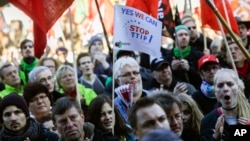Hundreds of thousands of people rallied Saturday in the German capital against the massive free-trade accord being negotiated by the European Union and the United States.
Berlin police said about 100,000 people took part in the demonstration, while organizers claimed 250,000 turned out to protest the Trans-Atlantic Trade and Investment Partnership, or TTIP.
Germany's government has pushed the deal, saying it will boost the global economy and give small and midsized companies a better chance at competing on the world market while reducing bureaucracy.
WATCH: Trade Pact Critics March in Berlin
Opponents have been critical of what they perceive as opaque negotiations carried out away from public scrutiny, and they fear that the pact will hand too much power to big multinationals at the expense of consumers and workers.
The European Union and United States have been negotiating since 2013 on TTIP, and supporters hope it will gain momentum now that the U.S., Japan and other Pacific Rim nations have reached an agreement on a separate trade deal.
Obama lauds TPP
In the U.S. on Saturday, President Barack Obama touted the Trans-Pacific Partnership deal reached this past week, saying it "promotes American values and protects American workers."
The president said in his weekly address that it took five years to negotiate the agreement because "I wanted to get the best possible deal for American workers. ... Outdated trade rules put our workers at a disadvantage. And TPP will change that."
The TPP agreement, a complex deal affecting about 40 percent of the global economy, includes rules for the international trade of drugs, cars and dairy products.
Obama said the TPP includes the strongest labor and environmental standards in history. "And unlike past trade agreements, these standards are actually enforceable," he said.
TPP supporters say the pact would boost trade and economic growth for participants. U.S. critics of the deal say it does too little to protect American jobs or the environment. They also contend that it would raise the cost of some drugs.
Candidates weigh in
The drug sentiment was echoed by presidential hopeful Hillary Clinton. As Obama's former secretary of state, Clinton helped negotiate the pact that she now says she opposes because she thinks it would benefit drug companies over patients. She said she was also "worried" about currency manipulation.
Donald Trump, another presidential hopeful, said on Twitter that TPP was "a terrible deal."
Congress must approve the deal in the coming months for it to take effect. Obama will need bipartisan support, which has been difficult to obtain on many issues.
"Right now, other countries charge foreign taxes on goods that are made in America," Obama said. "Vietnam puts taxes as high as 70 percent on every car American automakers sell there. Those taxes and other trade barriers put our workers at a disadvantage."
"TPP is going to change that," the president said. "It eliminates more than 18,000 of these taxes on American goods and services. And that way, we're boosting America's farmers, ranchers, manufacturers and small-business owners — make it easier for them to sell their products abroad. That's what it means to level the playing field for American workers and businesses."
The president said past trade deals have not always "lived up to their promise," resulting in bad deals for the U.S. that have made "folks suspicious of any new trade initiatives."
"But let's be clear," he said. "Our future depends not on what past trade deals did wrong, but on doing new trade deals right. And that's what the TPP does."
The 12 nations that worked on the TPP are Australia, Brunei, Canada, Chile, Japan, Malaysia, Mexico, New Zealand, Peru, Singapore, the United States and Vietnam.
